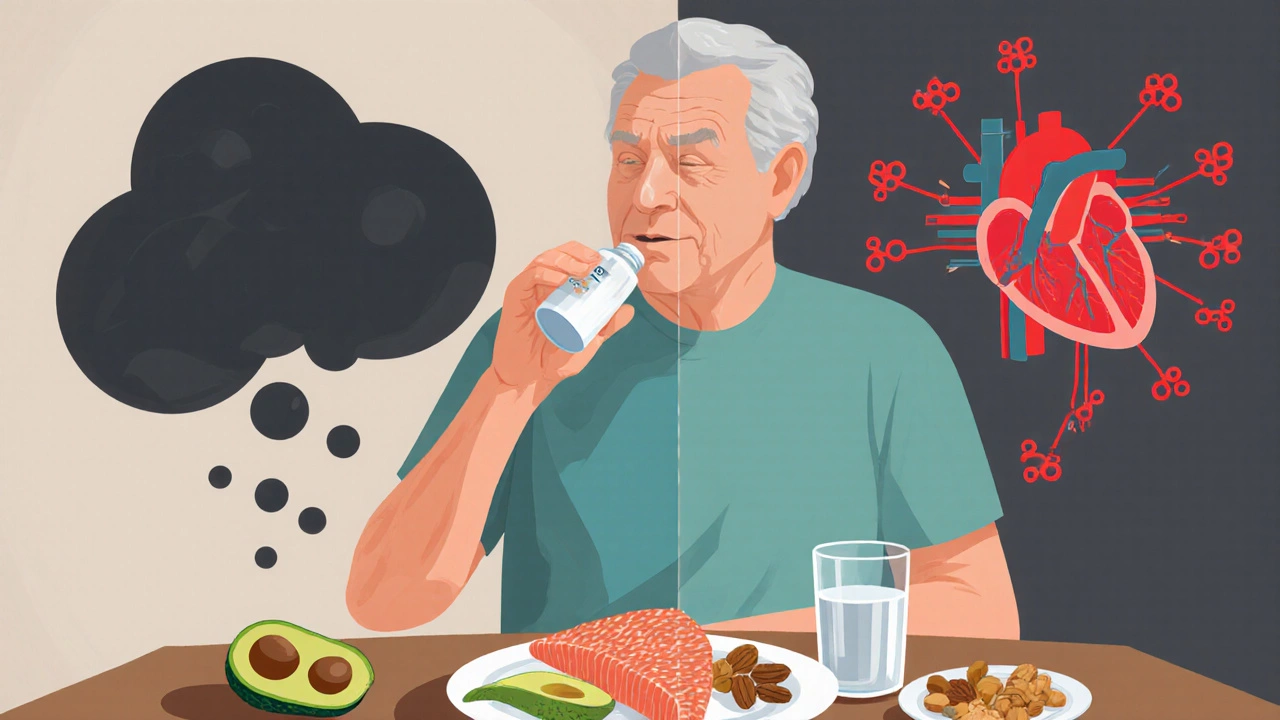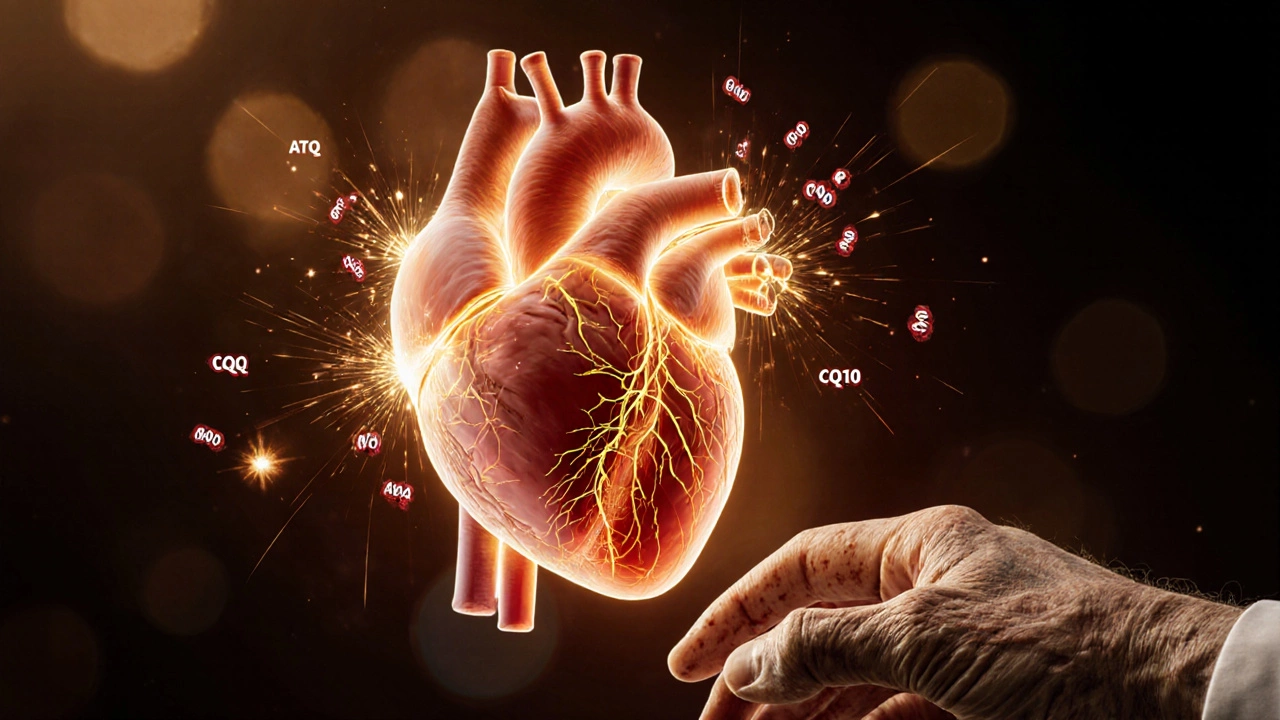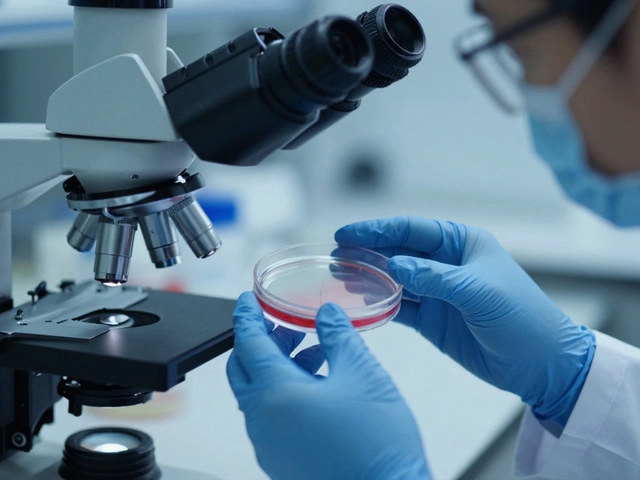CoQ10 Dosage Calculator
Personalized CoQ10 Recommendation
Find your ideal CoQ10 dosage based on your health goals
Your Recommendation
CoQ10, or coenzyme Q10, is a compound your body makes naturally - and it’s one of the most studied supplements when it comes to energy, heart health, and aging. You might have seen it in pill form at your local pharmacy or health store, often marketed as an anti-aging or heart support supplement. But what does it actually do? And is there real science behind the claims?
CoQ10 helps your cells make energy
Every cell in your body needs energy to function. That energy comes from mitochondria, the tiny powerhouses inside each cell. CoQ10 plays a key role in turning food into usable energy (ATP). Without enough CoQ10, your cells struggle to produce the fuel they need.
This is why people often feel more tired when their CoQ10 levels drop. Levels naturally decline as you age - by age 70, your body may have only half the CoQ10 it had at age 20. That’s not just about feeling sluggish. It can affect muscle performance, brain function, and even how fast you recover after exercise.
Studies show that supplementing with CoQ10 (typically 100-200 mg daily) can improve energy levels in people with chronic fatigue. One 2018 trial in older adults found that those taking CoQ10 reported better physical performance and less fatigue after 12 weeks compared to those on placebo.
It supports heart health - especially if you’re on statins
Your heart is the most energy-hungry organ in your body. It beats over 100,000 times a day. That’s why heart tissue has some of the highest concentrations of CoQ10.
Low CoQ10 levels are linked to heart failure, high blood pressure, and poor circulation. In fact, people with heart failure often have significantly lower CoQ10 in their blood than healthy individuals.
Multiple clinical trials have shown that CoQ10 supplementation can improve heart function. A major 2014 study published in the Journal of the American College of Cardiology followed over 400 people with moderate to severe heart failure. Those who took 100 mg of CoQ10 three times a day for two years had 43% fewer major cardiovascular events - like hospitalizations or death - compared to those who didn’t.
There’s also a strong link between statin drugs and CoQ10. Statins (like atorvastatin or rosuvastatin) lower cholesterol but also block your body’s ability to make CoQ10. Many people on statins report muscle pain or weakness - and that’s often due to low CoQ10. Taking 100-200 mg of CoQ10 daily alongside statins can reduce muscle side effects in up to 75% of users, according to a 2020 meta-analysis.
CoQ10 may slow signs of aging
Aging isn’t just about wrinkles. At the cellular level, aging is tied to oxidative stress - damage caused by free radicals. Your body fights this with antioxidants, and CoQ10 is one of the most important ones.
Unlike vitamin C or E, CoQ10 works inside your cells, especially in the mitochondria, where most free radicals are produced. It doesn’t just neutralize damage - it also helps regenerate other antioxidants like vitamin E.
Research shows CoQ10 can reduce markers of oxidative stress in older adults. One study in people over 65 found that after six months of taking 200 mg daily, their levels of malondialdehyde (a key marker of cell damage) dropped by nearly 30%. Skin studies have also shown improved elasticity and reduced fine lines with topical and oral CoQ10.
It’s not a magic anti-aging pill, but when combined with good sleep, nutrition, and exercise, CoQ10 helps your cells stay healthier longer.

It may improve fertility in men and women
CoQ10’s role in energy production matters for reproductive health too. Sperm need a lot of energy to swim, and eggs need strong mitochondria to mature properly.
In men, low sperm motility is a common cause of infertility. A 2018 study in the Journal of Clinical Endocrinology & Metabolism found that men taking 200 mg of CoQ10 daily for six months saw a 53% increase in sperm motility and a 20% increase in sperm count.
For women, especially those over 35, egg quality declines with age - and mitochondrial function is a big reason why. Small studies suggest CoQ10 supplementation may improve egg quality and ovarian response in women undergoing IVF. While more research is needed, many fertility clinics now recommend CoQ10 as a supportive supplement.
Who might benefit most from CoQ10?
Not everyone needs to take CoQ10. But certain groups see the clearest benefits:
- People over 40 - natural levels drop sharply after this age
- Those on statin medications - CoQ10 depletion is common
- People with heart conditions - including high blood pressure or heart failure
- Those with chronic fatigue or low energy
- Men with low sperm motility
- Women over 35 trying to conceive
If you’re healthy, young, and active, your body likely makes enough CoQ10. But if you’re feeling run down, have heart concerns, or are on long-term medication, it’s worth checking your levels - or simply trying a supplement.

How to take CoQ10 and what to look for
CoQ10 comes in two forms: ubiquinone and ubiquinol. Ubiquinol is the active, reduced form your body uses. It’s more expensive but better absorbed, especially if you’re over 40 or have trouble converting ubiquinone.
Dosage varies by need:
- General health: 100 mg daily
- Heart support or statin users: 100-200 mg daily
- Fertility or energy issues: 200-300 mg daily
Take it with a meal that contains fat - CoQ10 is fat-soluble, so it absorbs better with oils. Olive oil, avocado, or nuts work well.
Quality matters. Look for brands that use patented forms like Kaneka QH (ubiquinol) or ubiquinone from reputable suppliers. Avoid cheap, unbranded supplements - they often don’t contain what’s listed on the label.
Side effects and safety
CoQ10 is one of the safest supplements around. Most people tolerate it well. The most common side effect is mild stomach upset - usually from taking it on an empty stomach. That’s easily fixed by taking it with food.
It doesn’t interact badly with most medications. But if you’re on blood thinners like warfarin, talk to your doctor. One small study suggested CoQ10 might slightly reduce warfarin’s effect, so monitoring is wise.
It’s safe for long-term use. People in clinical trials have taken it for over five years without serious issues.
Bottom line: Is CoQ10 worth it?
Yes - if you fall into one of the groups that benefit most. It’s not a miracle cure, but it’s one of the few supplements with strong, consistent evidence behind it. It helps your cells work better, protects your heart, supports energy, and may even help you age more gracefully.
Start with 100 mg daily of ubiquinol, take it with food, and give it at least 8 weeks. Many people notice less fatigue, better recovery, or improved mood before they even think about heart benefits.
CoQ10 doesn’t replace healthy habits - but it does help your body do what it’s already designed to do: keep going, strong and steady.
Can CoQ10 help with muscle pain from statins?
Yes. Statins reduce your body’s natural CoQ10 production, which can lead to muscle pain, weakness, or cramps. Studies show that taking 100-200 mg of CoQ10 daily can reduce these side effects in up to 75% of people. It’s one of the most well-supported uses for CoQ10.
Is CoQ10 the same as vitamin Q?
No. CoQ10 is sometimes called vitamin Q in marketing, but it’s not a true vitamin. Vitamins are essential nutrients your body can’t make - but your body produces CoQ10 naturally. It’s a coenzyme, not a vitamin. You only need to supplement if your levels drop due to age, illness, or medication.
How long does it take for CoQ10 to work?
It depends on what you’re using it for. For energy and fatigue, some people notice changes in 2-4 weeks. For heart health or fertility, it usually takes 8-12 weeks to see measurable results. Consistency matters - take it daily, not just when you feel tired.
Can you get enough CoQ10 from food?
You can get small amounts from food - organ meats like liver, fatty fish like salmon, and nuts like peanuts. But you’d need to eat over 1 pound of beef or 3 pounds of sardines daily to match a 100 mg supplement. Food sources aren’t enough to raise levels significantly, which is why supplements are used for therapeutic benefits.
Does CoQ10 help with migraines?
Yes. Several studies show that CoQ10 can reduce the frequency and severity of migraines. A 2019 trial found that 61% of migraine sufferers who took 100 mg three times daily had at least a 50% reduction in headache days. It’s now recommended by some neurology groups as a preventive option.








